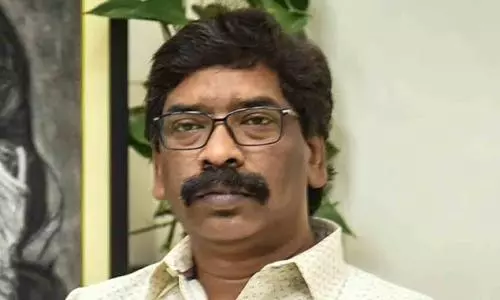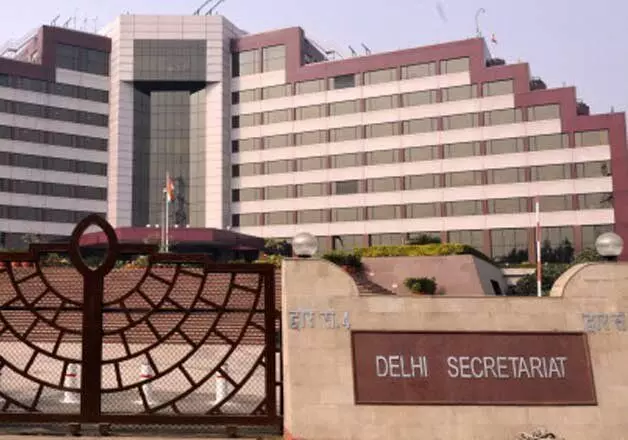
Using the Constitution to subvert democracy
text_fieldsFor quite some time, the sangh parivar regime at the Centre has made a method of usurping democratic rights by using the name of the very Constitution that it subverts in the process. Finding specious arguments to implement what suits it, using loopholes in the Constitution and previous court judgements, the central government has has in effect torpedoed democracy through such ill-advised pursuits. The latest example of this is the new legislation on government of the Union Territory of Delhi passed by the Lok Sabha that aims at clipping the wings of the elected government of Delhi. The Government of National Capital Territory of Delhi (Amendment)- GNCTD - Bill) that was passed by the Lok Sabha on Monday and by the Rajya Sabha on Wednesday, had created considerable furore in the Rajya Sabha on Tuesday. The bill is patently a deliberate legislative ploy aimed at wresting the powers with the elected state/union territories and vesting them with the union government.
When Delhi was recognised in 1991 as a union territory with an elected assembly, the state was granted limited legislative powers. But by defining the post of Lieutenant Governor (LG) as synonymous with the government, the new amendment takes away what little powers was left of that. Through this, for any decision on executive matters , the elected government will have to obtain the approval of the LG. The Centre is making it clear that regardless of who the people elect, the Centre will control the government through the LG, evidently the Centre's nominee. Last day's Rajya Sabha proceedings and happenings outside it, saw the all out efforts of the central government to obtain the approval of upper house at any cost and the counter efforts of the Opposition to prevent that.
Despite winning power twice at the Centre, the BJP regime has not been able to bring the capital under its control instead of that of Arvind Kejriwal's Aam Aadmi Party (AAP), a fact indigestible to the BJP still. The Centre until now has been reining in Kejriwal - who consistently advocates full statehood for Delhi - using Lt Governors ever since the latter came to power in 2013. The power tussle in 2015 with the then LG Najeeb Jung had reached a stage in which Kejriwal made a stay-in strike at the LG's official residence. During the second term of AAP, Jung's successor Anil Baijal also was found toeing the same Centre line of power politics. For his part, Kejriwal, in a departure from his previous term's policy, did try during his poll campaign for the second term, not to alienate the BJP and to be friendly with them on crucial issues. When the Centre passed the amendment to strip Jammu-Kashmir of its special status, during the heat of the anti-citizenship law agitation in Delhi and during the racial attacks on Muslims, Kejriwal had taken dubious stances, which were often seen as supportive of the Modi government. Kejriwal, an exponent of full statehood for Delhi, had surprised most when he endorsed the bifurcation of Jammu-Kashmir and turning the state into centrally ruled territories. But despite such sympathetic positions towards the Modi government and the sangh parivar approaches, what he got in return was the Centre's drastic step of depriving his government of even the remainder of powers with it. No wonder, Kejriwal's tweet grumbling that the new amendment is an insult to the people of Delhi and those who were defeated in elections were trying to usurp power, could only win the ridicule from activists like senior lawyer Prashant Bhushan and nof Kashmiris.
At the crescendo of the power struggle in 2015 with Kejriwal, the then Lt Governor Najeeb Jung had said that he was the government in Delhi and the meaning of government in the Constitution was the Lt Governor. At that time, the Delhi High Court had ordered that the Lieutenant Governor was not bound to act according to the decision of the Delhi cabinet. After the Delhi government went in appeal against this in the Supreme Court, the court decreed that except in matters of law and order, police and land utilisation, the LG didn't have any powers of his own. Governor and Lieutenant Governor are institutions which constitutionally have to work in co-operation with the elected governments to facilitate smooth running of administration in states and union territories. They do not constitute a parallel centre of power. The Centre is setting itself on a course to totally upset this concept by making a new law using an excuse in the name of the Constitution. Thus this 'Delhi mutiny' only gives credence to the Opposition allegation that the central government is subverting democracy to bring all power and authority into its own ambit.
























